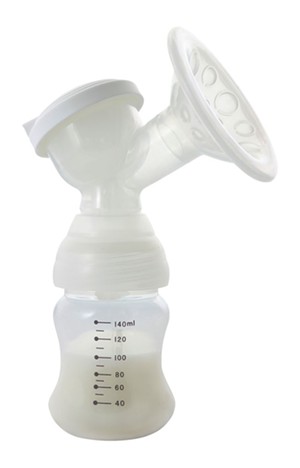Published April 28, 2015 at 10:00 a.m.
Juliana Taylor's breast milk feeds three babies: her 11-month-old daughter, who she nurses the conventional way, and the children of two other Vermont mothers who live nearby.
Taylor engages in what's called "altruistic milk sharing" — she produces more milk than her baby can drink and gives away the surplus to local moms in need, friends of friends and women she meets online. She doesn't receive any payment and, if offered, would refuse it. "I just felt good about it as a gift," she reflects while soothing her fussy child from her home in Burlington. "I feel connected to the babies when I pump. I end up thinking about them quite a bit."
Milk sharing is nothing new — until the invention of formula, moms who couldn't or didn't want to breastfeed would hire a wet nurse to do it for them. Now that formula has fallen out of favor and "breast is best," many moms who can't nurse are seeking out new, 21st century ways to find breast milk for their children.
They have a few options. The safest method is purchasing screened and pasteurized milk from a nonprofit milk bank. But banked milk is out of reach for most moms because it's expensive, scarce and largely reserved for preemies and dangerously ill infants. Parents can also purchase milk from anonymous donors online, but as two recent studies indicate, buyers run the risk of receiving supplies watered down with cow's milk or contaminated with viruses or bacteria.
Milk seekers can also look closer to home and seek out friends and family members who are willing and able to donate. And after exhausting those personal connections, parents today have one more option: grassroots social networking sites through which women like Juliana Taylor donate milk.
The two main online milk-sharing sites are Eats on Feets and Human Milk 4 Human Babies. They're both global exchanges with active Vermont Facebook pages where moms in need and moms with milk can trade messages and connect. "Milk needed in Williston!" reads a recent message on the Eats on Feets Vermont page. "Milk to share in Winooski!" reads another.
Both organizations forbid sales on their sites because their founders believe that the profit motive corrupts the altruistic exchange of "liquid gold" and increases the likelihood that the milk will be contaminated. The sites also encourage parents to request blood tests and health information from potential donors.
But medical professionals are still wary of this grassroots phenomenon. The American Academy of Pediatrics both recommends that moms exclusively breastfeed for the first six months of their babies' lives and discourages women from online milk sharing.
Nancy Clark, a Central Vermont lactation consultant and RN, acknowledged that this conflicting advice creates a real dilemma for moms who aren't able to breastfeed. She's comfortable with women receiving milk from close friends or family members, but milk sharing via the internet makes her nervous. "I'm skeptical of anything happening on Facebook. I just think the potential risks are pretty high," she says.
That hasn't dissuaded women like Rachel, an adoptive mom from Washington County, from using Juliana Taylor's milk. At first Rachel, who requested that we not use her real name, was hoping to pay someone to express milk for her. She says it only seemed fair to compensate women for their labor. Taylor, for example, pumps two to three times a day to produce 10-18 ounces of milk for donation. But the social networking sites prohibit sales, and Rachel wasn't comfortable buying anonymous milk online.
Because she wanted to feed her son breast milk exclusively and wasn't making any of her own, she needed more milk than one donor could provide. That meant meeting lots of candidates and asking them intrusive questions about their diet, habits and blood test results.
"I only ended up with four women, I guess, that followed through with the whole thing," Rachel recalls. "More than that contacted me, but I just think that was too much for them and it was a delicate boundary for me. I don't really want to insult you and yet I have to protect my son. If he got HIV from this I would never forgive myself."
When Rachel's son was a month old, she found a donor with a large supply of excess milk and was able to feed him just on breast milk for two months. Now, five months later, she primarily uses formula and supplements with Taylor's milk. "I feel so grateful to them," she says of the women who've donated their milk. "It's amazing to me sometimes to think, because he was also adopted, how many women have nourished him to be who he is. He is a product of many."
Taylor also thinks about Rachel's son, and the others that she's fed. "I have visions of them playing together or getting together a couple of times a year," she reflects.
But the most important thing to her, she insists, is that women have the opportunity to choose how they're going to nourish their children. "There are so many ways to feed your baby," she says. Whether they use breast milk or formula, "I don't want any woman to feel beaten up by the choice she makes."
The original print version of this article was headlined "Supply & Demand"
This article was originally published in Seven Days' monthly parenting magazine, Kids VT.
More By This Author
Speaking of KidsVT - Features,
-

Mr. Fix-It: Marty Spaulding Works Behind the Scenes to Help Students Learn on Campus
Aug 24, 2021 -

Back to School During Delta: A Pediatrician With Young Children Offers a Road Map — and Survival Strategies
Aug 24, 2021 -

Can You Dig It? Make Your Own Worm Farm With These Simple Steps
Aug 24, 2021 -

How to Savor Vermont's Shortest, Sweetest Season
Jun 29, 2021 -

Good Citizens Rocked the At-Home Challenge
Apr 6, 2021 - More »
Comments
Comments are closed.
From 2014-2020, Seven Days allowed readers to comment on all stories posted on our website. While we've appreciated the suggestions and insights, right now Seven Days is prioritizing our core mission — producing high-quality, responsible local journalism — over moderating online debates between readers.
To criticize, correct or praise our reporting, please send us a letter to the editor or send us a tip. We’ll check it out and report the results.
Online comments may return when we have better tech tools for managing them. Thanks for reading.















































